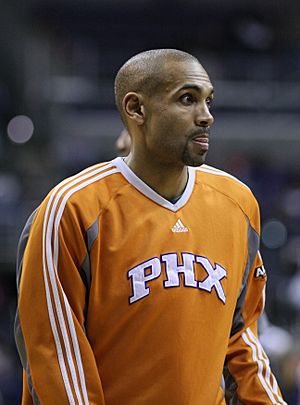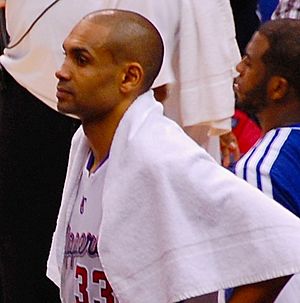Grant Hill facts for kids
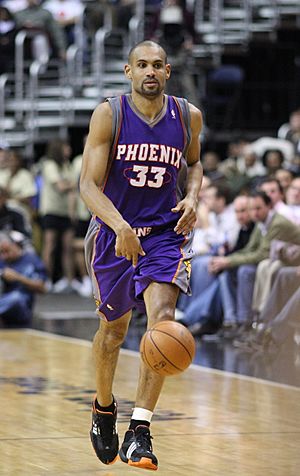
Hill with the Phoenix Suns in 2007
|
||||||||||||||||||||||||||
| Atlanta Hawks | ||||||||||||||||||||||||||
|---|---|---|---|---|---|---|---|---|---|---|---|---|---|---|---|---|---|---|---|---|---|---|---|---|---|---|
| Vice Chair of the Board | ||||||||||||||||||||||||||
| Personal information | ||||||||||||||||||||||||||
| Born | October 5, 1972 Dallas, Texas, U.S. |
|||||||||||||||||||||||||
| High school | South Lakes (Reston, Virginia) |
|||||||||||||||||||||||||
| Listed height | 6 ft 8 in (2.03 m) | |||||||||||||||||||||||||
| Listed weight | 225 lb (102 kg) | |||||||||||||||||||||||||
| Career information | ||||||||||||||||||||||||||
| College | Duke (1990–1994) | |||||||||||||||||||||||||
| NBA Draft | 1994 / Round: 1 / Pick: 3rd overall | |||||||||||||||||||||||||
| Selected by the Detroit Pistons | ||||||||||||||||||||||||||
| Pro career | 1994–2013 | |||||||||||||||||||||||||
| League | NBA | |||||||||||||||||||||||||
| Career history | ||||||||||||||||||||||||||
| 1994–2000 | Detroit Pistons | |||||||||||||||||||||||||
| 2000–2007 | Orlando Magic | |||||||||||||||||||||||||
| 2007–2012 | Phoenix Suns | |||||||||||||||||||||||||
| 2012–2013 | Los Angeles Clippers | |||||||||||||||||||||||||
| Career highlights and awards | ||||||||||||||||||||||||||
|
||||||||||||||||||||||||||
| Career NBA statistics | ||||||||||||||||||||||||||
| Points | 17,137 (16.7 ppg) | |||||||||||||||||||||||||
| Rebounds | 6,169 (6.0 rpg) | |||||||||||||||||||||||||
| Assists | 4,252 (4.1 apg) | |||||||||||||||||||||||||
|
Medals
|
||||||||||||||||||||||||||
Grant Henry Hill (born October 5, 1972) is an American basketball executive and former player. He is a co-owner of the Atlanta Hawks in the National Basketball Association (NBA). He also partly owns Orlando City SC (a soccer team) and Orlando Pride (a women's soccer team). In 2024, he became part of a group that bought the Baltimore Orioles baseball team. Grant Hill also works as a basketball analyst for TV networks like CBS and NBC.
Grant Hill played four years at Duke University and was considered one of the best college basketball players ever. In the NBA, he played for the Detroit Pistons, Orlando Magic, Phoenix Suns, and Los Angeles Clippers. He mostly played as a small forward. Hill was chosen for the NBA All-Star team seven times. He also won the NBA Sportsmanship Award three times. In 2018, he was honored by being inducted into the Naismith Basketball Hall of Fame.
Hill was named the ACC Player of the Year in 1994. He was also a two-time NCAA All-American and won two NCAA championships. Many people think he is one of the greatest players in the history of the Duke Blue Devils.
After college, the Pistons picked Hill third overall in the 1994 NBA draft. He shared the NBA Rookie of the Year Award in 1995 with Jason Kidd. Early in his NBA career, Hill was known as a great all-around player. He often led his team in points, rebounds, and assists. In his first six NBA seasons, Hill averaged 21.6 points, 7.9 rebounds, and 6.3 assists per game. He was also selected for the Eastern Conference All-Star Team five times.
An ankle injury in 2000 changed his career path. This injury bothered him for several years. He had surgery in March 2003, which led to serious health issues. He even missed the entire 2003–04 season because of it. In 2005, Hill returned to the All-Star team as a member of the Magic. He played in the Western Conference Finals in 2010 with the Phoenix Suns. After his ankle injury, Hill played 12 more seasons. He averaged 13.1 points, 4.7 rebounds, and 2.6 assists per game during that time. On June 1, 2013, Grant Hill announced he was retiring from the NBA.
In 2015, Grant Hill and Tony Ressler became part of a group that bought the Atlanta Hawks. In 2023, Hill and his wife, Tamia, also became part owners of the MLS club Orlando City and the NWSL club, Orlando Pride.
Contents
College Basketball Journey
When it was time to pick a college, Grant Hill's mother wanted him to go to Georgetown. His father preferred the University of North Carolina. But Hill chose to attend Duke University. He played four years for the Blue Devils. He helped them win national championships in 1991 and 1992. Duke was the first team since UCLA (1966–73) to win two championships in a row.
Even after losing key players like Christian Laettner and Bobby Hurley, Hill led Duke to the championship game again in 1994. However, they lost to the Arkansas Razorbacks. In 1993, Hill won an award for being the nation's best defensive player. In 1994, he was named the ACC Player of the Year. During his college career, Hill was the first player in ACC history to get more than 1,900 points, 700 rebounds, 400 assists, 200 steals, and 100 blocked shots. Because of his amazing college career, Duke retired his jersey number (33).
After his first year at Duke, Hill played for the U.S. team that won a bronze medal at the 1991 Pan American Games in Cuba. He also practiced against the famous "Dream Team" before the 1992 Barcelona Olympics.
Hill is also famous for a play called the "Hail Mary" in the 1992 NCAA tournament against Kentucky. Many people call it one of the greatest college basketball games ever. Duke was down by one point with only 2.1 seconds left in overtime. Hill threw the ball 75 feet across the court to Laettner, who made the game-winning shot as time ran out. Hill later made a film about Duke's back-to-back wins and this famous play. In 2016, Hill was inducted into the Duke Sports Hall of Fame.
Professional Basketball Career
Detroit Pistons (1994–2000)
The Detroit Pistons picked Grant Hill third overall in the 1994 NBA draft. He usually played as a small forward. In his first season, he averaged 19.9 points, 6.4 rebounds, and 5.0 assists per game. He was the first Pistons rookie since Isiah Thomas to score 1,000 points. Hill shared the NBA Rookie of the Year Award with Jason Kidd. He was also named to the All-NBA First Team in 1997.
Hill was very popular with fans. He was the first rookie ever to lead the NBA All-Star fan voting in 1995. In his second season (1995–96), he led the All-Star fan voting again, even beating Michael Jordan. During that season, Hill showed how good he was at everything by leading the NBA in triple-doubles (10). He also won a gold medal at the 1996 Summer Olympics in Atlanta with the U.S. men's basketball team.
In the 1996–97 season, Hill averaged 21.4 points, 9.0 rebounds, and 7.3 assists per game. He was the first player since Larry Bird to average 20 points, 9 rebounds, and 7 assists in a season. He led the league in triple-doubles again with 13. Hill finished third in the voting for the MVP.
Hill often ran the Pistons' offense, like a "point forward". From 1995–96 to 1998–99, he led the league in assists among non-guards. In the 1999 season, he led his team in points, rebounds, and assists for the third time. Only Wilt Chamberlain and Elgin Baylor had done that more than once before.
In the 1999–2000 season, Hill averaged 25.8 points, the third-highest in the league. He also averaged 6.6 rebounds and 5.2 assists. However, the Pistons never went far in the playoffs. On April 15, 2000, Hill sprained his left ankle. He tried to play in the playoffs, but his ankle got worse. The Miami Heat swept the Pistons. Hill was supposed to play in the 2000 Summer Olympics, but his ankle injury stopped him. This injury would cause problems for many years.
After his first six seasons, before the ankle injury, Hill had amazing stats. Only Oscar Robertson, Bird, Luka Doncic, and LeBron James have reached those numbers so early in their careers.
Orlando Magic (2000–2007)
In 2000, Grant Hill signed with the Orlando Magic. The Magic hoped he would team up with Tracy McGrady to make them a top NBA team. But Hill was often hurt by ankle injuries. He played only 4 games in his first season with the Magic, 14 in his second, and 29 in his third. He missed his entire fourth year (2003–04) with Orlando. Even with injuries, Hill played well when he could.
In March 2003, Hill had a big surgery on his ankle. Five days later, he got a high fever and convulsions. Doctors found he had a serious infection called MRSA. He was in the hospital for a week and needed special medicine for six months. After this, Hill became a strong supporter for MRSA awareness and prevention.
In the 2004–05 season, Hill played 67 games for the Magic. He averaged 19.7 points per game. Fans voted him an All-Star starter again, and he led the Eastern Conference team to a win. He also won the NBA Sportsmanship Award.
During the 2005–06 season, Hill was injured often again. He had groin injuries that kept him out for many games. He had surgery for a hernia and said he would consider retiring if he needed another surgery.
In the 2006–07 season, Hill returned despite rumors he might retire. He had therapy for his ankle and said it felt much better. He played 65 games, starting as a shooting guard. He averaged 14.4 points per game. This season, Hill made it to the playoffs for the first time since 2000. The Magic played against Hill's old team, the Detroit Pistons. The Pistons won the series 4–0. After this, Hill was unsure if he would return to the Magic or retire.
Phoenix Suns (2007–2012)
On July 5, 2007, Grant Hill decided to sign with the Phoenix Suns. He was allowed to wear his familiar No. 33 jersey. Hill fit well with the Suns' fast-paced style of play. He averaged double-digit points as a key player. He played in 70 games, his most since leaving Detroit. He averaged 13.1 points, 5.0 rebounds, and 2.9 assists per game.
In the 2008–2009 season, Hill played in all 82 games for the first time in his career. He averaged 12.0 points, 4.9 rebounds, and 2.3 assists per game.
On July 10, 2009, Hill decided to stay with the Phoenix Suns for two more years. In 2010, the Suns reached the Western Conference Semifinals. This was Hill's first playoff series victory, after 15 years in the league. The Suns swept the San Antonio Spurs 4–0. Then they played the Los Angeles Lakers in the Western Conference Finals, but lost in six games.
In 2010, Sporting News named him one of the smartest athletes in sports.
Hill stayed with the Suns for the 2010–11 season. He became one of only seven NBA players to average 13 or more points at age 38 or older. On January 15, 2011, Hill scored his 16,000th career point.
On December 9, 2011, Hill signed another one-year contract with the Phoenix Suns. By the end of the 2011–12 season, Hill had reached 17,000 career points.
Los Angeles Clippers (2012–2013)
After his contract with the Suns ended, many teams wanted Hill. On July 18, 2012, Hill signed with the Los Angeles Clippers. He had a knee injury in the preseason and missed three months. He finally played his first game with the Clippers on January 12, 2013. During the 2012–13 season, he played only 29 games. The Clippers finished with a great record and won their division for the first time. However, they lost to the Memphis Grizzlies in the first round of the playoffs.
Retirement and Hall of Fame
On June 1, 2013, Grant Hill announced he was retiring from professional basketball. He played for 19 seasons in the NBA.
On September 7, 2018, Hill was inducted into the Naismith Basketball Hall of Fame. This is a huge honor for basketball players.
Executive Roles
On June 24, 2015, the NBA approved a deal to sell the Atlanta Hawks team. Grant Hill was part of the group that bought the team. He became a co-owner of the Hawks.
On April 3, 2021, USA Basketball named Hill as the managing director for the USA Men's National Team. He took over this role after the 2020 Summer Olympics.
In January 2024, Grant Hill joined a group that bought the Baltimore Orioles baseball team.
Broadcasting Career
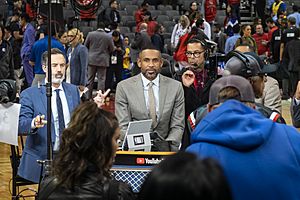
Since 2013, Grant Hill has hosted NBA Inside Stuff on NBA TV. He also works as a sports broadcaster for CBS. In 2015, Hill joined the main announcing team for the NCAA men's basketball tournament. He works with famous broadcasters Jim Nantz and Bill Raftery. Hill also works as an NBA analyst on TNT.
Hill signed a long-term deal with TNT Sports to cover more college basketball. He continues to be a lead analyst for the NCAA tournament. He also calls select games from the Big East and Big 12.
Hill also joined NBC as a game analyst for NBA games after the playoffs.
Sponsorships and Endorsements
- In the 1990s, the soft drink Sprite had a long-running ad campaign called "Grant Hill Drinks Sprite." These ads humorously showed how Sprite helped Hill's amazing basketball skills.
- Hill was a spokesperson for McDonald's restaurants. He also worked with watchmaker TAG Heuer and sportswear companies like Fila, Adidas, and Nike.
- In 2014, Hill appeared in ads for AT&T and Microsoft with his wife, Tamia.
In Television and Film
- In 1995, Hill appeared as himself in an episode of the FOX sitcom Living Single.
- In 1998, he was in an episode of Home Improvement.
- Hill is featured in the music video for the song "Rockstar" by Nickelback.
- Hill presented an award at the 1995 MTV Video Music Awards.
- A documentary called The Fab Five caused some discussion in 2011.
Personal Life and Family
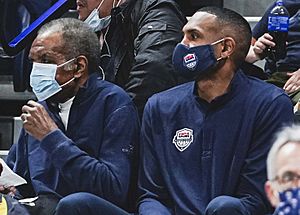
Grant Hill's father, Calvin Hill, was a former NFL football player. His mother, Janet, was a math teacher and business consultant. Grant was born in Dallas, Texas, and grew up in Virginia.
In 1996, Grant Hill met Canadian singer Tamia in Detroit, Michigan. They got married on July 24, 1999. They have two daughters, Myla Grace (born in 2002) and Lael Rose (born in 2007). The family lives in Windermere, Florida.
In 1999, Hill received the Golden Plate Award from the American Academy of Achievement.
After getting a serious MRSA infection in 2003, Hill became a strong advocate for preventing MRSA. He has appeared in public service announcements for a non-profit group called Stop MRSA Now!
Hill earned his college degree from Duke University. He studied history and political science.
Charitable Activities
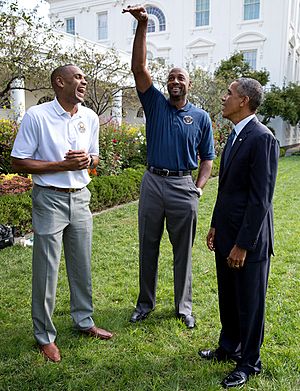
Grant Hill was a Vice-Chairman for the Board of Directors of the Special Olympic World Summer Games in 1999.
Grant Hill, his mother, and grandmother started a scholarship at Dillard University in New Orleans. This scholarship honors Hill's grandfather, who supported the university.
Hill was featured on a "READ" poster that supported libraries and encouraged reading.
Hill donated money to a day care center in New Haven, Connecticut. His father, Calvin, started the center in 1972 to help children and families.
Hill also funded an organization in his hometown of Reston, Virginia. This group helps students of all ages get an education.
Other Interests
Hill has a large collection of African-American art. He especially likes the work of Romare Bearden and Elizabeth Catlett. Some of his art was shown in museums from 2003 to 2006.
Hill has connections with the Democratic Party. When he was drafted into the NBA, President Bill Clinton called him to congratulate him. Hill publicly supported John Kerry in 2004 and Barack Obama in 2008 and 2012 for president.
NBA Career Statistics
| Legend | |||||
|---|---|---|---|---|---|
| GP | Games played | GS | Games started | MPG | Minutes per game |
| FG% | Field goal percentage | 3P% | 3-point field goal percentage | FT% | Free throw percentage |
| RPG | Rebounds per game | APG | Assists per game | SPG | Steals per game |
| BPG | Blocks per game | PPG | Points per game | Bold | Career high |
Regular season
| Year | Team | GP | GS | MPG | FG% | 3P% | FT% | RPG | APG | SPG | BPG | PPG |
|---|---|---|---|---|---|---|---|---|---|---|---|---|
| 1994–95 | Detroit | 70 | 69 | 38.3 | .477 | .148 | .732 | 6.4 | 5.0 | 1.8 | .9 | 19.9 |
| 1995–96 | Detroit | 80 | 80 | 40.8 | .462 | .192 | .751 | 9.8 | 6.9 | 1.3 | .6 | 20.2 |
| 1996–97 | Detroit | 80 | 80 | 39.3 | .496 | .303 | .711 | 9.0 | 7.3 | 1.8 | .6 | 21.4 |
| 1997–98 | Detroit | 81 | 81 | 40.7 | .452 | .143 | .740 | 7.7 | 6.8 | 1.8 | .7 | 21.1 |
| 1998–99 | Detroit | 50* | 50* | 37.0 | .479 | .000 | .752 | 7.1 | 6.0 | 1.6 | .5 | 21.1 |
| 1999–00 | Detroit | 74 | 74 | 37.5 | .489 | .347 | .795 | 6.6 | 5.2 | 1.4 | .6 | 25.8 |
| 2000–01 | Orlando | 4 | 4 | 33.3 | .442 | 1.000 | .615 | 6.3 | 6.3 | 1.3 | .5 | 13.8 |
| 2001–02 | Orlando | 14 | 14 | 36.6 | .426 | .000 | .863 | 8.9 | 4.6 | .6 | .3 | 16.8 |
| 2002–03 | Orlando | 29 | 29 | 29.1 | .492 | .250 | .819 | 7.1 | 4.2 | 1.0 | .4 | 14.5 |
| 2004–05 | Orlando | 67 | 67 | 34.9 | .509 | .231 | .821 | 4.7 | 3.3 | 1.4 | .4 | 19.7 |
| 2005–06 | Orlando | 21 | 17 | 29.2 | .490 | .250 | .765 | 3.8 | 2.3 | 1.1 | .3 | 15.1 |
| 2006–07 | Orlando | 65 | 64 | 30.9 | .518 | .167 | .765 | 3.6 | 2.1 | .9 | .4 | 14.4 |
| 2007–08 | Phoenix | 70 | 68 | 31.7 | .503 | .317 | .867 | 5.0 | 2.9 | .9 | .8 | 13.1 |
| 2008–09 | Phoenix | 82* | 68 | 29.8 | .523 | .316 | .808 | 4.9 | 2.3 | 1.1 | .7 | 12.0 |
| 2009–10 | Phoenix | 81 | 81 | 30.0 | .478 | .438 | .817 | 5.5 | 2.4 | .7 | .4 | 11.3 |
| 2010–11 | Phoenix | 80 | 80 | 30.1 | .484 | .395 | .829 | 4.2 | 2.5 | .8 | .4 | 13.2 |
| 2011–12 | Phoenix | 49 | 46 | 28.1 | .446 | .264 | .761 | 3.5 | 2.2 | .8 | .6 | 10.2 |
| 2012–13 | L.A. Clippers | 29 | 0 | 15.1 | .388 | .273 | .583 | 1.7 | .9 | .4 | .2 | 3.2 |
| Career | 1026 | 972 | 33.9 | .483 | .314 | .769 | 6.0 | 4.1 | 1.2 | .6 | 16.7 | |
| All-Star | 6 | 6 | 22.2 | .571 | .500 | .545 | 2.5 | 3.2 | 1.2 | .2 | 10.5 | |
Playoffs
| Year | Team | GP | GS | MPG | FG% | 3P% | FT% | RPG | APG | SPG | BPG | PPG |
|---|---|---|---|---|---|---|---|---|---|---|---|---|
| 1996 | Detroit | 3 | 3 | 38.3 | .564 | .500 | .857 | 7.3 | 3.7 | 1.0 | .0 | 19.0 |
| 1997 | Detroit | 5 | 5 | 40.6 | .437 | .000 | .718 | 6.8 | 5.4 | .8 | 1.0 | 23.6 |
| 1999 | Detroit | 5 | 5 | 35.2 | .457 | .000 | .813 | 7.2 | 7.4 | 2.0 | .4 | 19.4 |
| 2000 | Detroit | 2 | 2 | 27.5 | .375 | .500 | .900 | 5.5 | 4.5 | .5 | .0 | 11.0 |
| 2007 | Orlando | 4 | 4 | 35.8 | .500 | .000 | .667 | 5.5 | 3.8 | .5 | .3 | 15.0 |
| 2008 | Phoenix | 3 | 2 | 22.7 | .455 | .000 | 1.000 | 5.3 | 1.0 | .7 | .3 | 3.7 |
| 2010 | Phoenix | 16 | 16 | 28.3 | .480 | .188 | .868 | 5.8 | 2.3 | .8 | .6 | 9.6 |
| 2013 | L.A. Clippers | 1 | 0 | 20.0 | .500 | .000 | .000 | 4.0 | 2.0 | .0 | .0 | 4.0 |
| Career | 39 | 37 | 31.6 | .469 | .238 | .781 | 6.1 | 3.6 | .9 | .5 | 13.4 | |
See also
 In Spanish: Grant Hill para niños
In Spanish: Grant Hill para niños
- List of oldest and youngest NBA players
- List of National Basketball Association career triple-double leaders


